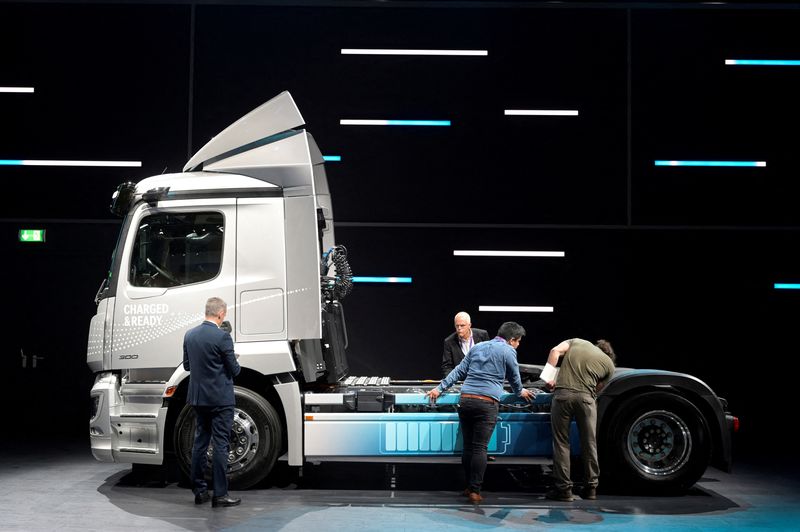Investing.com’s stocks of the week
(Reuters) -Daimler Truck expects revenues to grow as much as 60% between 2025 and 2030, top management of the truck and bus maker told investors on Tuesday.
The company's optimistic outlook, presented at a capital markets day in Boston, comes a year after Daimler (OTC:MBGAF) Truck became an independently listed company in a spinoff from Mercedes-Benz passenger cars, and as it focuses on building autonomous trucks.
Daimler Truck shares rose 2.5%.
Easing supply chain constraints and stronger demand in its core markets and the after-sales business prompted the company late on Monday to raise its profit and revenue guidance for 2023.
"We are sold out for 2023," CEO Martin Daum told Reuters in an interview on Tuesday. In Europe, the company is seeing strong orders for the first quarter of 2024. "Everything we hear from our large U.S. customers is for the same amount or a higher amount" of trucks, Daum said.
Among the longer-term goals spelled out on Tuesday, the company said it would target for 2030 at least 12% adjusted returns for its industrial business under favourable conditions and revenue growth of 40% to 60% from 2025 to 2030.
It expects to generate over 3 billion euros ($3.30 billion) in revenue and 1 billion euro earnings before interest and taxes from autonomous driving in 2030, it said in a statement.
Daum said Daimler could have autonomous trucks in commercial operation by 2027. "We know the problems we have to solve," he said.
Daimler plans to sell customers its own robotic driving system through its Torc Robotics unit, and will supply vehicles that customers can equip with other autonomous driving technology. Waymo, the robot driving unit of Alphabet (NASDAQ:GOOGL), is developing self-driving truck technology in a partnership with Daimler.
Daum said he would soon announce a partnership with a battery cell producer in the United States due to incentives provided by the Biden administration's Inflation Reduction Act, which is aimed at boosting production in the U.S.
But Daum said he is "very much concerned" that there will not be adequate hydrogen refueling or electric charging infrastructure in place to support government and industry goals to shift trucking off fossil fuels.
"The infrastructure is the biggest challenge we have ahead of us," he said.
($1 = 0.9098 euro)
